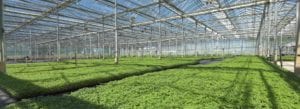Rabbis Avrohom and Chaim Litvin are feeling a rush that doesn’t come from any substance.
It does come from a successful niche business model in a fledgling but growing industry.
The Litvins, principals in the nonprofit Kentucky Kosher (KYK), which certifies foods, food additives and spirits as kosher, is branching out into Cannabidiol oils (CBD for short).
CBD is an extract from hemp, a plant in the cannabis family, which is better known for the high-inducing marijuana. Hemp, which is legal in all 50 states, produces no such experience.
According to Avrohom Litvin, KYK’s kosher administrator, the service now supervises 10 CBD distillers nationwide and advises two overseas (in Israel and Norway), taking up about 50 percent of his staff’s time.
“It’s here to stay,” Litvin said.
CBD oil can be found in everything from pain relievers to teas and power waters. It also is sold as an additive. According to a Harvard Medical School article, the hemp extract has been touted for its medical benefits and can even be found in one drug approved by the U.S. Food and Drug Administration (FDA) to treat epilepsy (Epidiolex).
It is also used to treat anxiety, insomnia and other conditions.
“CBD has shown great potential in a myriad of medical uses, most specifically as an anti-inflammatory,” said Litvin. “The kosher world is as excited about this as anyone else and wants to take part, but the item has to be kosher.”
But CBD’s status and health benefits remain murky. Though the 2018 U.S. Farm Bill removed hemp from its definition of marijuana, the FDA says it is still illegal to market CBD by adding it to a food or labeling it as a dietary supplement. Litvin said the FDA is trying to “categorize” CBD, which currently doesn’t fit into those groups, but the products KYK supervises are completely legal.
Some CBD products have been marketed with unproven medical claims, and the substance does have potential side effects such as liver injury, drug interactions and male reproductive toxicity.
The FDA recommends talking to a physician before using any CBD product.
While CBD is an essential component of medical marijuana, KYK takes no position on its use.
But CBD does not cause a marijuana-like high. A 2017 report from the World Health Organization found that the extract “exhibits no effects indicative of any abuse or dependence potential [in humans].”
At first blush, It might seem as though CBD wouldn’t need a hechshur (kosher certification seal). Hemp, after all, is a plant, not a meat or dairy product.
The need for kosher supervision comes, Litvin said, after CBD is extracted from hemp when other ingredients – colorings and flavors – are added to make products.
“How did you dry it? How did you extract it? How did you solidify it with something else? What carrier oil (oils that dilute the extract) did you use? Did you heat it? Did you not? What else was used on the same machinery? There are myriad questions that come up.”
In fact, Chaim Litvin, KYK’s kosher coordinator, who regularly visits the manufacturing plants, said certifying beef or poultry is much easier than CBD.
“The animals that are in the [meatpacking] facility presumably are all kosher,” he said. “There’s are no other ingredients in a steak besides cattle, as opposed to a CBD oil, which could have seven or eight or 10 or 20 flavors.”
The fact that CBD oil is frequently cooked into whatever product will contain it only complicates the process, Chaim Litvin added.
“In a meat place, there’s no cooking involved, so there’s no heat, which is a big issue with kosher. If something is cooked, then the utensils and everything – the status – could change. So you have a lot more issues to look at.”
The Litvins didn’t just dive into the CBD market. They spent two years researching the product and its properties before offering certification.
The elder Litvin also visits trade conventions and conferences to stay on top of new products coming out.
KYK is not the only certification body supervising CBD products, OU Kosher has been doing so since the Farm Bill passed, according to its CEO, Rabbi Menachem Genack.
But Litvin believes people who are “wary” of taking CBD because of its tenuous connection to marijuana, might feel better about the product if it carries a hechshur.
“When it has a kosher mark, they feel it is more kosher, if you will, in the bigger sense of the word,” he said, “that it’s been approved, that it doesn’t go against anyone’s values or morals and it’s a safe product.”




